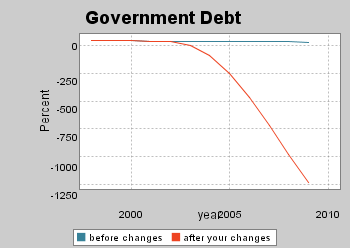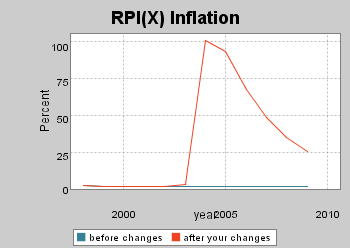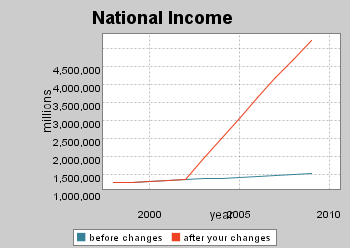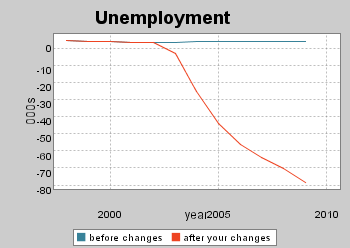General Motors, the world's largest automaker, announced recently that it will be cutting 30,000 jobs and closing about a dozen facilities in an effort to save $7 billion a year and return the company to profitability. Those 30,000 jobs that will be cut represent about 22% of General Motors' hourly workforce.
But the United Auto Workers union may make things difficult for GM. They of course have blasted the move as unfair:
Not surprisingly, the leadership of the United Auto Workers union blasted the move as unfair.
"We have said consistently that General Motors cannot shrink itself to prosperity. In fact, shrinking General Motors only exacerbates its problems," UAW President Ron Gettelfinger and Vice President Richard Shoemaker said in a joint statement. "Unfortunately, it is workers, their families and our communities that are being forced to suffer because of the failures of others," they added.
...
The company's contract with the United Auto Workers union essentially prevents layoffs before it expires in September 2007, as the company needs to pay union members whether or not there is a job for them.
To a small degree, the UAW is right: you can't simply shrink a company into prosperity. But what you can do is
manage a company into prosperity. And some of that management involves cutting excess capacity, which is a big, costly problem for GM right now. And given the fact that the UAW contract guarantees pay for these 30,000 employees through 2007, it looks like GM has its hands tied. GM will be facing many difficulties in adjusting their payroll and excess production capacity in order to keep the company thriving.
What is the UAW doing essentially? They are telling GM what to do. They are restricting GM's ability to manage itself as a company, and contract and expand as the market demands. Of course, UAW would never have any problem with GM expanding its workforce, because that would mean more union members, more union dues, and more clout for the union itself. But whenever GM tries to cut back, the UAW fights tooth and nail. The UAW serves as the greatest impediment to GM's attempts to become profitable again. Ironically, the longer it takes GM to turn a profit, the more financial hot water the company gets in, and the hourly union jobs currently in force become even
more at risk.
In my opinion, GM (and all automakers in North America) should refuse to hire union members. The UAW doesn't make cars: GM does. The UAW doesn't make its own jobs: it takes money from those who have jobs, and the UAW itself has only a small payroll for the union administrators. But if it weren’t for automakers like GM, Ford, and others, the UAW wouldn't even be able to pay its own administrators or collect union dues. The UAW's entire existence is dependent upon auto giants like GM to employ its members. And yet here we have the UAW telling GM how to run itself. Maybe GM should tell the UAW how to operate, and tell it to shut the hell up.
What does a union like the UAW do? It fights for "decent pay," for one thing, which amounts to an artificial minimum wage within a niche industry (in this case, automotive jobs), and we all know how minimum wage situations hurt society and the economy. They also fight for as many jobs as possible, which restricts the employer’s ability to turn a profit, and in the long run only endangers the job security of everyone that works for the company. Indeed, it puts a greater risk on the mere existence of the company. And to top it off, the pay raises that the UAW fights for are either nullified or reduced in effectiveness for the union members because of the mandatory monthly union dues.
A union can do some good in a monopoly job market. But this is a capitalist economy, where over a dozen different automakers have huge operations in America, and the UAW is obsolete and superfluous. There is a literal automotive job market, where auto manufacturers naturally and necessarily have to compete with each other to offer the best jobs to attract the most capable workers. The unions don't need to exist to protect anybody's wages or job security. The nature of the free and competitive job market does that automatically.
But let's look at the heart of this particular issue: the 30,000 employees that will be laid off. It will be unfortunate for these 30,000 people to receive pink slips. But why artificially protect their jobs through coercion or restrictive, long-term contracts? These 30,000 people will have plenty of options once they get laid off. They can find other jobs at other automobile manufacturers. For example, if GM is laying them off due to lower sales, yet the car market is expanding (which it is), then that means that other companies like Toyota or Honda are increasing their sales. Those other companies will need to hire more people to produce the extra cars that are being sold. These 30,000 people can get jobs at the other companies (yes, Toyota and Honda have many large facilities operating locally in North America). Or the 30,000 people could get jobs in other fields. Or they could start their own car company!
If the UAW is right, and they think they know how to operate a car company better than the people who run GM, then why don’t they organize and start their own car company? It’s a free market and nobody is going to stop them from starting up a competing automobile company. They already have a 30,000 person strong workforce to tap into, after all. I already know what a UAW representative would answer to that question: they would say that the automaking industry is fierce and that they would be squeezed out of the market before they got a chance to sell a car. In other words, they would be admitting that they wouldn't be able to run the company efficiently and competitively enough to survive. So who the hell do they think they are telling GM how to sail its own ship?
The UAW has the attitude that their members have a
right to a job. That’s bullshit. Nobody has a right to a job, ever. What all those union members
do have a right to, is the freedom to
seek a job and be evaluated fairly for the job based on their own merits. This concept is totally foreign to the UAW, and the message is lost in the minds of its members if it ever reaches them at all. They would rather have an organization represent them and coerce a company into keeping them on the payroll rather than face the risk of market forces and merit-based employment. What a bunch of pussies.
Unions do not belong in a capitalist society. They do not belong in a competitive job market. They definitely should not be telling their members' employer how to run itself. But GM is also partly to blame for this problem, because they enable the UAW's evil behavior by agreeing to hire its members and by signing restrictive contracts. GM should stand up for itself and refuse to hire any more union members or sign any more contracts with the UAW.
Looking at the situation from a bird’s eye view, we see a competitive job market and a variety of employers. Then we see a monopoly of sorts, and that monopoly is the UAW. Is it any surprise that the UAW is the entity in the puzzle that's screwing everything up? I hate unions and want them all to disappear, but for sheer smart-ass irony value, I'd love to see a competing union sprout up and drive the UAW out of business. Wouldn't that be something!






